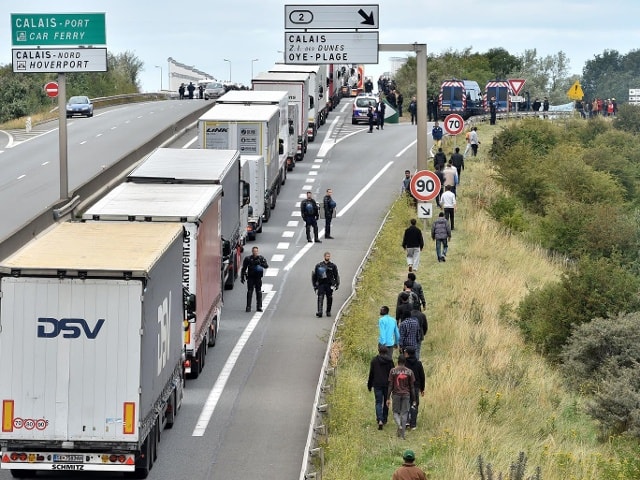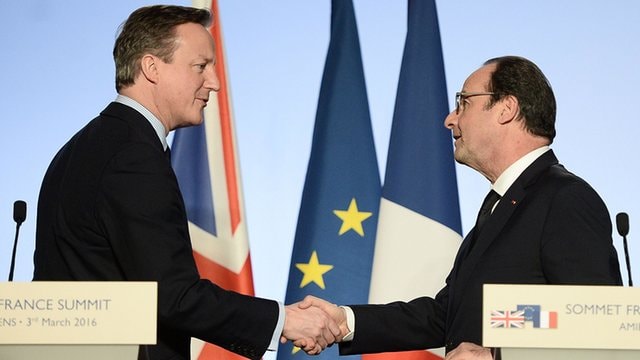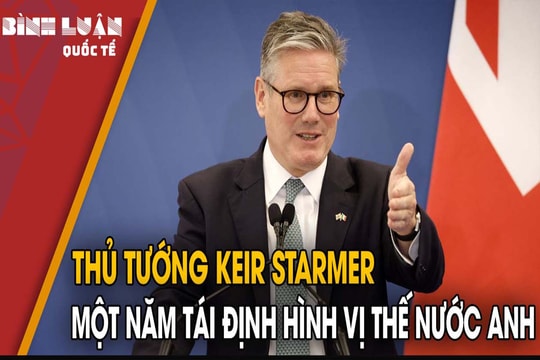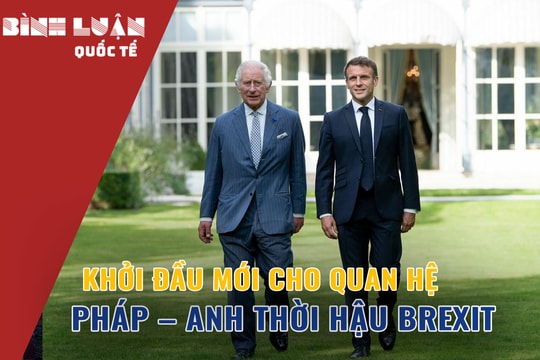Are EU elites "threatening" Britain?
(Baonghean) - Recently, the European Union (EU) has been continuously "surrounded" by issues related to the migration crisis and the scenario of losing the UK. The intertwined troubles have strongly affected the psychology of countries, many countries have chosen to erect "virtual fences" that go against the principles of the EU, and cracks between members have begun to appear.
 |
| A police officer tries to stop migrants from boarding a lorry heading to Britain, outside the Calais port in 2015. Photo: Getty Images. |
Most recently, on March 3, after a bilateral summit between the leaders of France and the UK, President François Hollande implicitly "threatened" the UK about a not-so-bright prospect if the country "leaves".
In the event that the British people vote in favor of separating from the bloc, the foggy country will have to face many "consequences", including the possibility that migrants currently stopping at the Calais camp in France will find their way to the UK, "submerging" this country with a wave of immigration that brings with it many unpredictable challenges.
This is the firm assertion of French President François Hollande, which many people believe implies a bit of a "threat" to the British leader in the current extremely complex and difficult context in the EU.
In a press conference after the summit with Mr. Cameron, Mr. Hollande reiterated previous warnings about the consequences of border controls, but did not forget to emphasize: "I do not want to threaten anyone, I simply want to tell the truth."
According to observers, the French President's recent remarks to the press are the deepest intervention ever in the referendum on EU membership, or in other words, Britain's decision to stay or leave.
The dire consequences that the head of state in the city of light foresees in a number of important areas: the common market, financial trade, and even economic development between countries. At the moment, all these risks may not mean that everything that has existed for so long will be destroyed, bringing the EU people an undesirable catastrophic scenario, but in all fairness, certain human consequences are obvious.
Although Mr. Hollande still asserts that the Anglo-French friendship will hardly be shaken, just a small mistake in the way of handling the crisis will push the countries further away, potentially facing problems that are difficult to solve in a day or two.
The Élysée’s bleak outlook was not welcomed by the leader of the House of Commons, Chris Grayling. Instead, according to the Guardian, Grayling said Mr Hollande’s comments were “desperate”, and accused European elites of “colluding” with big business to pile pressure on British voters.
Mr Hollande’s intervention comes after French Economy Minister Emmanuel Macron told the Financial Times that he was hopeful that the Le Touquet Treaty (which allows the UK to deploy border police in France) would be invalidated if Britain voted to leave the EU, meaning migrants currently in the Calais camp could be allowed to cross into the UK.
Boris Johnson, the mayor of London and a supporter of an immediate Brexit, immediately spoke out against it, arguing that there was no reason to change the treaty, as Le Touquet was an intergovernmental agreement signed between the British and French governments. France would have nothing to gain if the agreements were broken. Many British politicians also said that the French statements were “more like blackmail than a real threat”.
Because if the prospect of Britain leaving the EU becomes a reality, this country will once again have control of its borders and can decide who is allowed to enter and who is not. They are even sure that even in the case that France intends to push illegal migrants onto trains or ferries to bring them to Britain, the foggy country is fully capable of “sending them straight back to France”.
 |
| British Prime Minister David Cameron (left) and French President François Hollande after a summit meeting on March 3. Photo: Guardian. |
So how are British politicians in Downing Street reacting? Is the wave of fear about “interference” by high-ranking foreign leaders having much of an impact on the country?
Prime Minister Cameron has denied that the government is under pressure, instead promising an additional £17m to help France deal with the migrant crisis gripping Calais and other locations. The money will go towards efforts to move migrants from the Calais camp to other facilities in France and work with neighbouring countries to repatriate migrants who do not need protection.
He responded cryptically but clearly in a spirit of inquiry: “A lot of people are trying to express their personal views, and we can choose to listen or not. I would say to people, when you have leaders from countries that want the best for the UK – New Zealand, Australia, Canada, the US, France – when you get a message from them, it’s worth listening to. When business organisations representing small and large businesses say there are risks if the UK leaves the EU, you should listen to them.”
In the current situation when France has not clearly expressed its stance on this issue, the British leader's response is flexible but no less resolute.
It is worth noting that, along with the troubles arising from the outside, the signs of cracks within the EU are becoming more and more evident. EU members need to understand that the existence of a sustainable union depends largely on how countries resolve disagreements, on the basis of constructiveness and mutual respect.
Intimidation tricks are not only ineffective, but can also be counterproductive if applied at the wrong time or to the wrong target.
Thu Giang
| RELATED NEWS |
|---|




